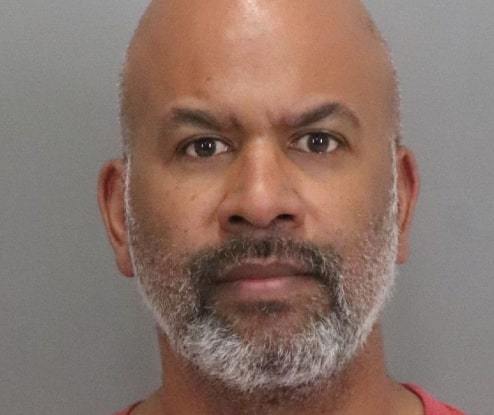
MOUNTAIN VIEW — A New Mexico man has been arrested and extradited back to California 16 years after leaving DNA on a pillow while assaulting a woman inside a motel, police said.
Investigators homed in on Albuquerque resident Van Overton, Jr., 45, last month after an Albuquerque rape kit from 1997 was finally tested and proved to match DNA from the 2004 Mountain View sexual assault.
“After 16 years, you either think your suspect is deceased or they’re already serving a prison term where it wasn’t required to collect their DNA,” said Mountain View Police Capt. Jessica Nowaski in an interview Friday. “I’m just really excited that we were able to bring closure to our victim.”

At around 4 a.m. one February morning in 2004, Mountain View police officers — including Nowaski, then in the Crimes Against Persons Unit — responded to a disturbing call.
A 42-year-old woman was asleep in Lucky U Motel, located on Fairchild Drive just off of Bayshore Freeway, when a man snuck in through the first-floor window and sexually assaulted her for at least 30 minutes before taking off, she told Nowaski’s team.
Police scoured the neighborhood, knocking doors and talking to suspects that matched the description, but it proved fruitless. They also collected DNA from the motel room pillow, coming up with a profile for the national DNA database known as Combined DNA Index System, or CODIS.
But over the next decade and a half, no matches arose in the database — even as Nowaski checked in with the woman each year around the anniversary of her assault.
“It’s very difficult when you don’t know — ‘Who did this to me?’ — and it just creates a complete void,” Nowaski said. “To go year after year knowing that person is not being held accountable is very, very difficult.”
In the meantime, Albuquerque police were dealing with their own problem: A years-long backlog of rape kits. In 2018, Mayor Tim Keller signed an executive order — along with funding — so that the city could begin working its way through over 5,000 untested rape kits, some dating back to the 1980s.
One of those kits proved a match. In late January 2020, Nowaski got a call: An unknown sample from a 1997 Albuquerque assault, newly entered into CODIS, appeared to match the DNA from her 2004 case.
The next few weeks were a whirlwind. As Albuquerque and Mountain View police pored over the two cases, tips initially led them to a suspect in Tuscon, who they ruled out. Help from the Tuscon department ultimately led them back to Albuquerque, where Overton lives.
On Feb. 7, Albuquerque police served a search warrant to obtain a DNA sample from Overton, which Mountain View detectives flew out to pick up in person. Two days later on Feb. 9, Santa Clara County District Attorney’s Crime Lab confirmed his sample matched the DNA profiles for the two cases.
Records show that Overton lived in the Bay Area between 2002 and 2006, Nowaski said, bookended by his time in Albuquerque.
Overton was extradited back to California and arraigned Santa Clara County Superior Court on Thursday. He has been charged with various crimes related to sexual assault, including forced oral copulation and burglary with the intention to commit rape, and is being held without bail.
Although the proliferation of DNA testing sites like 23andMe and GEDmatch have allowed investigators to crack various cold cases — including that of the Golden State Killer — the key to Overton’s arrest was simply Albuquerque working its way through the backlog, Nowaski said.
As of Friday, the city had just 27 of the 5,418 backlogged kits left to test, police said.
Earlier this week, Nowaski and other members of the Mountain View team sat down with the victim to explain the sudden developments in the case — leaving her in what the police captain described as a state of relieved shock.
“She said she can finally get a good night’s sleep,” Nowaski said.














